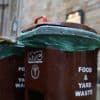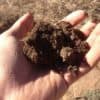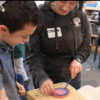Congregation Shaarey Zedek in Southfield, MI is setting the bar for sustainability high with their excellent work as a member of the Hazon Seal of Sustainability Cohort 2016! Between planning their first Green Kiddush, to using only glass mugs and recyclable paper products at events, there seems to be no limit on what they can achieve. After completing the Hazon Seal Audit, the Green Team at Shaarey Zedek immediately replaced all Styrofoam cups in the Berman Center of Education with glass cups that the congregation had in storage. They also made sure that the congregation’s clergy team spoke about the Green Team and its work during a Shabbat sermon, to get everyone excited about greening and increase awareness of the important work the Green Team does. Shaarey Zedek’s Green Kiddush and Tu B’shvat Seder on the Shabbat of Tu B’shvat was also well-received. Wren Beaulieu-Hack – Director of the Berman Center for Jewish Education at Shaarey Zedek – says that “The day we spent celebrating Tu B’Shvat, as a community was the most successful project we’ve completed thus far. It was wonderful to see our congregants talking with each other about environmental issues through a Jewish lens and to see […]









